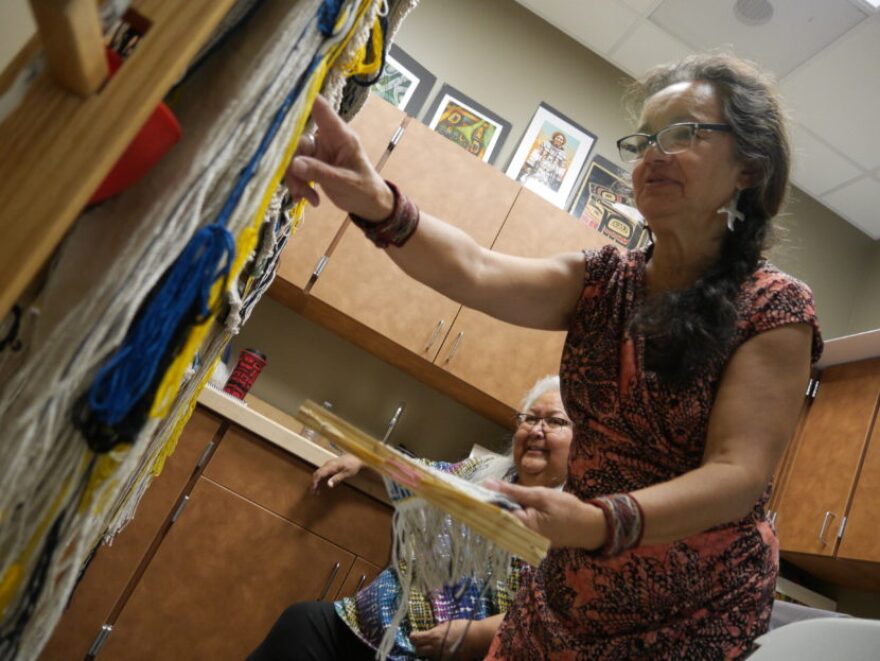Neiman Marcus is one of the clothing retailers that’s seen a decline in sales because of the coronavirus. The company filed for bankruptcy in early May — just weeks after it was sued by Sealaska Heritage Institute.
Lily Hope remembers seeing her mother’s piece hanging at an art show at the Heard Museum in Phoenix. The robe was called “Discovering the Angles of an Electrified Heart,” and it won first place.
Hope’s mom, Clarissa Rizal, died in 2016, and Hope’s family later had some of that work copyrighted. Not long after that, Hope got a message from some friends. They sent links to multiple websites, including Neiman Marcus. The company was selling a very similar-looking garment to the piece her mother wove.
Hope’s immediate thought was “What are they thinking? What makes someone think that’s OK?”
Ravenstail weaving has been practiced by Tlingit, Haida and Tsimshian people for hundreds of years. Rizal has been credited as an important influence on reviving the tradition. Hope was taught to weave by her mother and is now a weaver herself.
The “Ravenstail knitted coat” — retailing for more than $2,500 dollars — features the same bold geometric patterns seen in Northwest Coast weaving. Hope says she also recognized flourishes that were distinctly her mother’s. As the website links to the coat kept filling up her inbox, she wasn’t sure what to do.
“With each one of them, I was like ‘yep, I’ve seen it’,” Hope said. “And then I was like ‘I wonder if there would be something to do about it?'”
Hope met on the phone with Sealaska Heritage Institute in Juneau, and she says they decided to take a stand.
“It doesn’t feel good as an Indigenous artist to think that the work I make could be mass produced,” Hope said.
Sealaska Heritage Institute sued Neiman Marcus in the spring for alleged copyright infringement and violating the Indian Arts and Crafts Act — a law that ensures products marketed as Native American or Native Alaskan are authentic.
President Rosita Worl called it “one of the most blatant examples of cultural appropriation” she’d ever seen. The case is thought to be the first time in the U.S. a business has been sued for copying a traditional Indigenous pattern. Though, it’s far from the first time there’s been concern over the issue.
The Italian clothing company that makes the “Ravenstail knitted coat” is described as “paying homage to Native American iconography.”
“It doesn’t work that way because you’ve taken their property,” said Jacob Adams, Sealaska Heritage Institute’s lawyer on the case. “You’ve stolen it and that’s the end of the discussion.”
He says copyright law does allow for inspiration.
“What is not allowed is copying,” he said.
And he thinks that’s what’s happening with the “Ravenstail knitted coat” and other Indigenous patterns and cultural property, which have been used to sell products.
“This isn’t a call to end all external use of these patterns,” Adams said. “It’s a call to do things appropriately.”
Adams thinks there is an example of a corporation doing things appropriately: Walt Disney Animation Studios.
The song “Vuelie” is in the opening of the princess saga “Frozen” and its sequel “Frozen 2.” It’s composed of Sámi chants. For the first film, Disney was accused of whitewashing Indigenous Sámi culture. For the second film, the company entered into a legal contract with Sámi leaders.
Adams says that’s an important distinction. This isn’t some kind of soft law thing. It’s not passive, like asking for permission: It’s something you must do — recognizing Indigenous groups have the right to say, “no.”
“Even if we want to do things appropriately sometimes it’s difficult to know how. So, just starting at that basic principle of recognizing these rights, it gives us a roadmap of how to properly engage,” Adams said.
Adams wants the Sealaska Heritage Institute lawsuit to further that discussion. He says the Neiman Marcus bankruptcy has complicated things, but the case is still moving forward.
Sealaska Heritage Institute’s President, Rosita Worl, didn’t want to comment verbally on the ongoing case but added in writing:
“My hopes are that businesses will develop policies and practices to respect the cultural and intellectual property of Indigenous Peoples, and that they would be open to opportunities to collaborate with Indigenous Peoples.”




